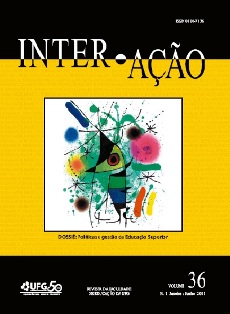HIGHER EDUCATION POLICY IN THE LUIZ INACIO LULA DA SILVA GOVERNMENT (2003-2008): THE DIFFERENT MEANINGS OF THE DISCOURSE OF INCLUSION
DOI:
https://doi.org/10.5216/ia.v36i1.15027Abstract
this article examines higher education policies presented in a set of regulatory documents during the Luiz Inacio Lula da Silva government period from 2003 to 2008. It also seeks to identify the different meanings of the discourse on inclusion at this level of education. The research was undertaken using documentary and bibliographical analyses. It identified different understandings of the word inclusion as a discourse drawn up in a capitalist society. It was concluded that the inclusion discourse is pervaded with the contradictions and antagonisms proper to the clash between the social and economic interests of different social classes and the varying interests of the working classes and dominant groups.Downloads
Downloads
Published
How to Cite
Issue
Section
License
Inter-Ação uses the Creative Commons Attribution 4.0 License for Open Access Journals (Open Archives Initiative - OAI) as the basis for the transfer of rights. Open access means making documents available on the Internet free of charge, so that users can read, download, copy, distribute, print, search, or link to the full text of documents, process them for indexing, use them as input data for software programs, or use them for any other lawful purpose, without financial, legal, or technical barriers.
Authors publishing in this journal agree to the following conditions:
1) Authors retain copyright and grant the journal the right of first publication, with the work simultaneously licensed under the Creative Commons Attribution License, which permits redistribution of the work with attribution and first publication in this journal.
2) Authors are permitted to enter into additional, separate agreements for non-exclusive distribution of the version of the work published in this journal (e.g., for publication in an institutional repository or as a book chapter), with attribution and first publication in this journal.
3) Authors are permitted and encouraged to publish and distribute their work online (e.g. in institutional repositories or on their home page) at any time before or during the editorial process, as this may generate productive changes as well as increase the impact and citation of the published work.















